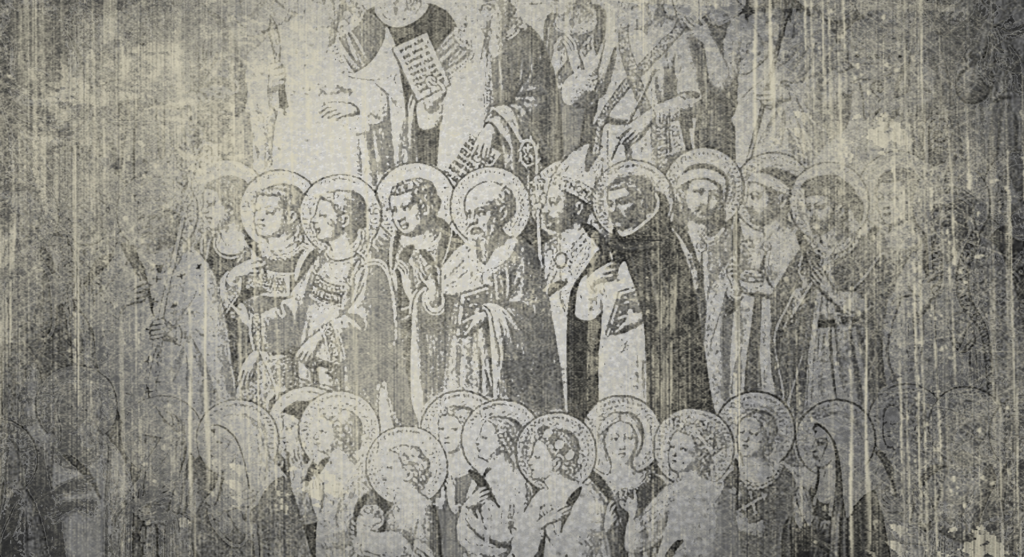
ONE OF THE most important leaders of the Reformation was John Calvin.
Calvin was only ten years old when Luther broke from the Catholic Church, but as an adult, Calvin became one of Protestantism’s most zealous advocates.
Calvin published his first religious tract in 1536 in Basel, Switzerland—a city by the Swiss-German border.
Calvin spent his adult life writing and teaching his own unique interpretations of Protestant doctrine.
The result was the creation of a Protestant denomination named after him, “Calvinism,” which was headquartered in Geneva.
Calvin continued in the mystical vein of Martin Luther.
As we recall, Luther said that spiritual salvation was not something that a human being could achieve through his or her own labors.
Instead, salvation required an act of belief.
The same idea was promulgated by Calvin, but with a harsher twist.
According’ to Calvin’s doctrine, not even an act of faith or belief would ensure a person’s spiritual survival.
Calvin proclaimed instead that a person’s spiritual salvation, or lack of it, was already predetermined before birth by God.
Is Everything Predetermined or Do We Have a Free Will – Library of Rickandria
Not only had God decided in advance who would achieve spiritual salvation and who would not, but there was absolutely nothing a person could do about God’s decision.
Who Created God If God Created Everything? – Library of Rickandria
This unhappy doctrine is known as “predestination.”
Calvin’s predestination teachings offered people little comfort because they stressed that most human beings were spiritually condemned.
Those humans favored by God before birth were known as the “Elect.”
The Elect were few in number and could do nothing to share their good fortune with others.
The Elect had only one real duty on Earth, proclaimed Calvin, and that was to suppress the sin of others as a service to “God.”
Calvin, of course, was one of the Elect.
One might ask: why would “God” condemn nearly every soul before birth and then continue to punish them after birth?
It seems rather cruel.
According to Calvin, the human race was still being punished for the “original sin” of Adam and Eve.
As we recall, the “original sin” was early man’s attempt to gain knowledge of ethics and spiritual immortality.
Calvin did not attempt to justify predestination, despite its obvious unfairness.
He preached instead that predestination was a mystery to which all people should be humbled.
Many things of “God” were never meant to be understood by human beings, he said.
Calvinism was more than a Sunday religion.
Bible Stories You Won’t Hear in Sunday School – Library of Rickandria
It was a way of life.
It demanded of its adherents a pragmatic and austere lifestyle in which a person’s highest duty was to glorify God in his or her daily actions.
Is Your God a Devil? – Library of Rickandria
People were taught that their positions in life, no matter what those positions happened to be, were their “callings” by God.
A life should be lived as though it were a Supreme Being’s will that a person was where he or she was.
Calvinism was clearly a philosophy of feudalism for the modern age.
On religious grounds, Calvin forbade:
- drunkenness
- gambling
- dancing
and singing flippant tunes.
Those were among the sins that the Elect had been put on Earth to stamp out.
To no one’s surprise, Calvinists quickly developed a reputation for being dour and colorless.
They also grew violent.
Calvin was not a man of tolerance and he adopted some of the vicious practices of the East Roman emperors.
For example, Calvin encouraged the death penalty for heresy against his new doctrines and he demanded that ”witches” be burned to death at the stake.
WITCHES – Library of Rickandria
Calvinism traveled from its stronghold in Switzerland to other countries.
In the Netherlands, Calvinists had played a very large role in agitating and bringing about the Eighty Years War, which gave us the Bank of Amsterdam.
In Great Britain, Calvinism was the basis of the Puritan religion.
Like their Calvinist brethren in Holland, some English Puritans decided to assert their gloomy beliefs and material self-interests through violent revolution.
In the year 1642, a group of wealthy and prominent British Puritans led a full-scale civil war against the English king, Charles I.
The English Revolution – Library of Rickandria
In Puritan eyes, Charles had committed crimes against God by marrying a Catholic and by being tolerant of Catholicism.
The Dark History of the Vatican – Library of Rickandria
After winning the civil war and beheading Charles, the victorious Puritan armies placed their own dictator in charge of Britain:
Under Cromwell, the Puritans were able to assert their religious beliefs into the arena of foreign policy.
English Puritans believed strongly in the concept of Armageddon, i.e. the Final Battle.
They believed that the great Final Battle had begun and would climax in the latter 17th century, and that the Puritans’ civil war against Charles I was a part of that Battle.
The Pope was labeled the anti-Christ and Catholicism was considered Satan’s tool.
The Identity of Satan – Library of Rickandria
Cromwell tried to shape English foreign policy around these beliefs by working to solidify international Protestant unity and by waging war against Catholics in various parts of Europe.
Cromwell believed that the English Puritans were God’s “second chosen” people* and that his actions were all part of Biblical prophecy.
* The Hebrews were considered God’s “first chosen,” but they had fallen out of favor.
Calvinist cosmology did much to shape Puritan ideas about war.
Engaging in war was glorified.
The Puritans believed that tension and struggle were permanent elements of the cosmic scheme because of the eternal struggle between God and Satan.
Who is Satan to the Jews? – Library of Rickandria
Professor Michael Walzer, in his intriguing book, Revolution of the Saints: A Study in the Origins of Radical Politics, explains their belief this way:
As there is permanent opposition and conflict in the cosmos, so there is permanent warfare on earth…
This tension was itself an aspect of salvation: a man at ease was a man lost. [1]

It is vital to understand this Puritan idea because it exalts war as a necessary step to spiritual salvation.
It was also one of the seeds which gave us the Marxist philosophy of “dialectical materialism.” [2]
Reading the Signs – Today’s Lesson: Karl Marx – Library of Rickandria
This Puritan belief is one of the most pernicious ideas ever taught by the Custodial religions.
It caused Puritans to view peace as an affront to God because peace meant that the struggle against “Satan” had ceased!
Jewish Rabbis Admit that Satan is God of the Gentiles – Library of Rickandria
“The world’s peace is the keenest war against God,” wrote Thomas Taylor in 1630. *
* Dialectical materialism is the philosophy which states that conflicts between social classes are inevitable and that such conflicts are the first stage of a process that will ultimately bring about a classless Utopia on Earth.
The highest calling of a Puritan man was to march off to war for the glory of God.
When there were (heaven forbid) no wars in progress, men were encouraged to attend military drills for recreation:
And in religious respects, since every man will have recreations, that be best which is freest from sin, that best which strengtheneth a man…
then abandon your carding, dicing, chambering, wantonness, dalliance, scurrilous discoursing and vain raveling out of time, to frequent these exercises [military drills]… [3]
The Puritans’ ennoblement of war, coupled with their austere pragmatism, helped bring about major changes in the manner of fighting wars.
Generations earlier, the Renaissance had had a very interesting effect on warfare in Europe.
War had become a “gentleman’s” activity—ornate and full of bluster.
European rulers expended considerable sums of money to create aesthetic and colorful armies.
- Bright uniforms
- flapping banners
- fancy armor
were the order of the day.
Significantly, pageantry replaced combat on the battlefield.
More often than not, the dazzling Renaissance armies engaged in endless maneuverings against one another with little actual contact.
After a great deal of pomp and show, a military stalemate would often occur followed by an elegant cavalry maneuver known as the caracole.
Each side could then declare itself the winner with few or no casualties, and march colorfully home to the adulation of its people.
Young male soldiers survived to quicken their lovers’ pulses with noble tales of gallantry and honor in the field.
In today’s jaded, ultra pragmatic world, the above activities might seem rather silly, like something from The Wizard of Oz.
They were, however, an exceptionally important phenomenon because the Renaissance style of warfare revealed the true nature of the human spirit.
The majority of people will gravitate away from war when given the chance.
They will turn arenas of conflict into theatres of pageantry.
They will choose:
- life
- color
- artistry
over:
- death
- pallor
- decay
The Renaissance was a short period of history revealing that when repression is eased, when intolerance and war-inducing philosophies diminish in importance, and when people are able to think and act more freely, human beings as a whole will naturally and automatically move away from war.
Puritan austerity and glorification of war helped make European wars bloodier.
Puritan armies operated on the idea that wars were meant to be fought effectively, not colorfully.
With that in mind, Puritans eliminated military glitter and developed efficient fighting units through rigorous drilling.
This pragmatic way of fighting quickly spread when other nations discovered that a beautifully embroidered banner could not win against an effectively pointed cannon.
While most military organizations today still engage in some pageantry, it is noticeably absent in the actual conduct of war.
JEWISH BANKSTERS’ WAR ON AMERICA & THE WORLD – Library of Rickandria
We observe instead austere fighting uniforms, curt efficiency, and military strategists who coldly calculate nuclear mega death with percentage points and probability factors.
The Nuclear Hoax – Library of Rickandria
They are all reflections of the pragmatism reintroduced into war by the Puritans and other Protestants.
As we survey the war-mangled bodies of our fellow humans who have been killed more efficiently and more pragmatically, perhaps we realize that Renaissance pageantry was not so silly after all.
Despite its early successes, the new Puritan government under Cromwell did not last very long.
The Stuart dynasty regained the British throne in 1660 with the crowning of Charles II (son of the beheaded Charles I).
Charles II died 25 years later in 1685 without an heir, and so his brother, James II, took the throne.
James ruled a mere three years, after which a second English revolution was launched in 1688 known as the “Glorious Revolution.”
Although a big issue was still Protestantism versus Catholicism, the Puritans did not lead the Glorious Revolution.
In fact, a great many Puritans had fled England to establish colonies in North America after Charles II assumed the throne.
The Glorious Revolution was led, in part, by none other than the House of Orange-Nassau.
By the time of the Glorious Revolution, the House of Orange was firmly seated on the Dutch throne.
How Orange also came to take the British throne and reign over three nations at once is a fascinating story of political intrigue.
Thrones infiltrated – Library of Rickandria
The Gods of Eden – Chapter 22: Marching Saints (basecamp.com)

Leave a Reply